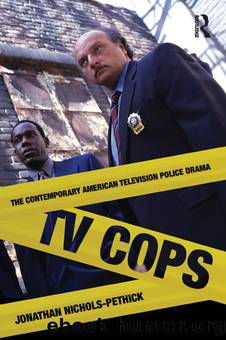TV Cops by Jonathan Nichols-Pethick

Author:Jonathan Nichols-Pethick [Nichols-Pethick, Jonathan]
Language: eng
Format: epub
Tags: Performing Arts, Television, General, Social Science, Popular Culture, Media Studies
ISBN: 9780415877879
Google: hKWea_h2n4AC
Publisher: Routledge
Published: 2012-01-15T05:43:03+00:00
To understand melodrama as a central mode of storytelling rather than a debased and anachronistic genre is to engage with what Brooks calls the âmelodramatic possibilitiesâ of a range of genres, including the police drama which is typically understood as primarily masculine and realist (Brooks 1976: 204). By engaging with the melodramatic possibilities of the police drama we can open up our understanding of it as something other than obsessively conservative in its drive toward justice and narrative closure. Instead, focusing on melodrama opens up opportunities to discuss the âintense inner dramaâ of the series âwhere every gesture, however frivolous or insignificant it may seem, is charged with the conflict between light and darkness, salvation and damnationâ (Brooks 1976: 5).
The critical division between realism and melodrama is misleading in that the distinction is based primarily on formal qualities such as acting, psychological motivation, and mise-en-scène: the surface indicators of verisimilitude. As Linda Williams argues, however, realistic effects serve melodramatic affects (1998: 42). Melodrama, rather than simply being a theatrical style of presentation, is a mode of representation concerned with moral divisions, and it must engage contemporary issues in a realistic manner if it is to have any resonance with audiences â that is, if it is to achieve affect. Indeed, as Gledhill insists, âmodern melodrama draws on contemporary discourses for the apportioning of responsibility, guilt, and innocence â psychoanalysis, marriage guidance, medical ethics, politics, even feminismâ (1992: 32). More specifically, Peter Brooks argues that, in addition to its focus on formal realism, the police series historically has offered one of the âclearest possible repertories of melodramatic conflictâ (1976: 204). Traditionally, this conflict has been staged between clearly drawn âvillains and heroes (who can often be recognized simply by uniform), of menace and salvationâ (Brooks 1976: 204). But the impulse toward even greater psychological realism through more complex portrayals of the police officer him/herself does not negate the melodramatic thrust of the series; it simply extends and modernizes it.
That [police series] have become increasingly âpsychologizedâ â that cops must be experts in human relations and bad men are quasi-Dosteoevskyan figures â in no sense violates the melodramatic context. It is not that melodramatic conflict has been interiorized and refined to the vanishing point, but on the contrary that psychology has been externalized, made accessible and immediate through a full realization of its melodramatic possibilities.
(Brooks 1976: 204)
Download
This site does not store any files on its server. We only index and link to content provided by other sites. Please contact the content providers to delete copyright contents if any and email us, we'll remove relevant links or contents immediately.
Still Foolin’ ’Em by Billy Crystal(36341)
Spell It Out by David Crystal(36106)
The Great Music City by Andrea Baker(31907)
Professional Troublemaker by Luvvie Ajayi Jones(29644)
Trainspotting by Irvine Welsh(21625)
Call Me by Your Name by André Aciman(20478)
We're Going to Need More Wine by Gabrielle Union(19028)
The Secret History by Donna Tartt(19012)
Cat's cradle by Kurt Vonnegut(15316)
Ready Player One by Cline Ernest(14625)
Molly's Game by Molly Bloom(14129)
Bombshells: Glamour Girls of a Lifetime by Sullivan Steve(14043)
The Goal (Off-Campus #4) by Elle Kennedy(13645)
Leonardo da Vinci by Walter Isaacson(13301)
4 3 2 1: A Novel by Paul Auster(12360)
The Social Justice Warrior Handbook by Lisa De Pasquale(12179)
The Break by Marian Keyes(9356)
Crazy Rich Asians by Kevin Kwan(9268)
The remains of the day by Kazuo Ishiguro(8961)
